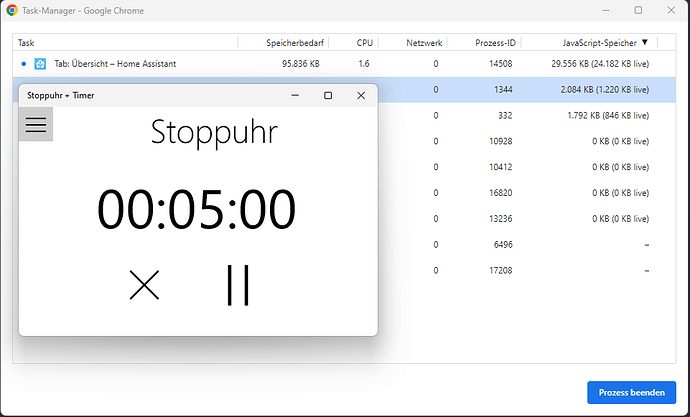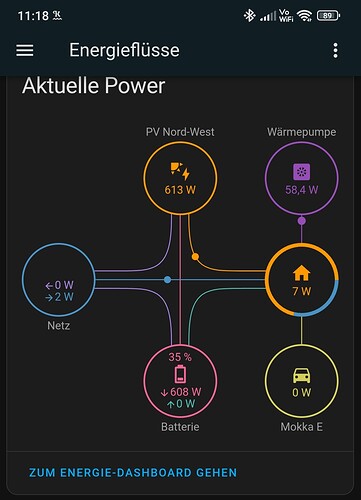good idea …
Congrats to this wonderful work. It doesn’t happen often to get a such complete solution. I once did a similar overview before I switched from openhab to home-assistant. This one was pure JS. One thing I made was to not hide the unused paths completely but to set them to 30% opacity. My opinion is that it looks nicer this way. Could you do this one on a further release or do you accept pull requests on github?
Thank you very much for the kind words, really means a lot!
I might add this functionality in the future, but I would also definitely appreciate any submitted PRs.
I think this could have some real impact if the opacity was configurable, just a thought…
I have a serious performance problem with this card. I first thought it’s because of the use of ApexChart-Card, but it still exists after removing all ApexChart-Cards.
So I tried to investigate the problem and measured the JavaScript-Heap-Space with and without the use of the Power Flow Plus Card.
Chrome freezes completely after a while, same problem with Firefox.
With Power Flow Card Plus:
Without Power Flow Card Plus:
I guess it has to do with the following violation issue because it doesn’t exists without the use of Power Flow Card Plus:

My card configuration:
type: custom:power-flow-card-plus
title: energie | flow
entities:
grid:
entity: sensor.evcc_grid_power
display_state: one_way
display_zero_tolerance: 25
solar:
entity: sensor.evcc_pv_power
display_zero_state: true
battery:
entity: sensor.evcc_battery_powerac
state_of_charge: sensor.evcc_battery_soc
display_state: one_way
display_zero_tolerance: 25
individual1:
entity: sensor.go_echarger_XXXXXX_nrg_12
display_zero: true
name: i3s
secondary_info:
entity: sensor.i3s_120_remaining_battery_percent
unit_of_measurement: '%'
clickable_entities: true
use_new_flow_rate_model: true
w_decimals: 0
kw_decimals: 1
max_expected_power: 6000
min_expected_power: 1
watt_threshold: 1000
card_mod:
style:
ha-icon:not(.small):
$: |
ha-svg-icon {
width: 32px;
height: 32px;
}
style: |
.label, span.secondary-info {
font-size: 13px !important;
}
.circle {
border-width: 4px !important;
font-size: 13px;
line-height: 13px;
}
.home .circle {
border-width: 0 !important;
}
path {
stroke-width: 2 !important;
}
What hardware do you have?
I am not experiencing any slowdowns with the card compared to without it.
Do you have Layout Card or any similar cards installed?
I guess I found it myself. This code I use with Card-Mod seems to be the problem:
Hey, sent you a pull request. If you like it, these are just my 2 cents 
I’ve discovered the integration recently and i like it very much. However there’s one thing I do not know how to handle.
My battery is a DC battery, thus it is loaded by the solar collector via the inverter. So the display is not really correct and the energy flow gives somewhat wrong values. I’d be great, if the battery is directly connected to the solar symbol as when charging, the power ist going from solar directly to the battery. Same thing when the battery is discharging. It then would “flow” from the battery to “solar” (OK, not really correct ;-)) and then to grid or home. Espacially when the battery is providing the power, the discharging values are not correct to the consumer consumption as the inverter needs to transform from DC to AC.
Maybe it will be possible to show the real values and the real energy flow.
Me too have a DC battery - my inverter is a Kostal plenticore and this one delivers all values about incoming and outgoing power from the battery (in W because of DC). Are your incoming and outgoing values calculated or do you have a sensor for them? If you have a sensor, did you use the ‘Display zero tolerance’ field in order to filter small amounts of energy “movements”? One of the next things I want to make @flixlixlix is to not only hide the small values with ‘display zero tolerance’ but also to not show these movements in the paths (lines) [if it’s ok for you I will send another PR]. Sometimes they blink up because the battery is charged with 1 Watt for 1 sec 
For the sake of completeness [just translate my german sensor names]
type: custom:power-flow-card-plus
entities:
battery:
entity: sensor.lade_entladeleistung_batterie
state_of_charge: sensor.batterie
invert_state: true
state_of_charge_unit_white_space: false
name: Batterie
display_state: one_way_no_zero
color:
consumption:
- 0
- 30
- 255
production:
- 0
- 51
- 255
display_zero_tolerance: 50
grid:
entity: sensor.verbrauch_einspeisung
name: Netz
color_circle: true
display_state: one_way_no_zero
invert_state: true
color:
consumption:
- 255
- 0
- 0
production:
- 49
- 184
- 0
display_zero_tolerance: 50
solar:
entity: sensor.produktion_pv
display_zero_state: true
color_icon: false
use_metadata: false
display_zero_tolerance: 20
home:
entity: sensor.haus_verbrauch
name: Haus
subtract_individual: true
override_state: true
use_metadata: false
clickable_entities: true
display_zero_lines: true
use_new_flow_rate_model: true
w_decimals: 0
kw_decimals: 1
min_flow_rate: 1
max_flow_rate: 5
max_expected_power: 12000
min_expected_power: 0.01
watt_threshold: 1000
transparency_zero_lines: 70
greyout_zero_lines: true
I get negative Values for Discharging and positive for charging. it’s the entity sensor.lade_entlaseleistung_batterie
Yes, I would even consider this a bug, since the display zero tolerance should really set the state back to 0 if it is not surpassed
What is this sheer beauty you did in the last panel? which cards are you using?
Nice card. Since this is a suggestions topic, my thoughts as mentioned earlier would be to have a few more individuals such as below.

I am using the Power Flow Card Plus for a live dashboard and it works great, really love this card!

Now, something I miss in the original Energy Dashboard from home assistant (below) is the actual split between Solar and Grid in the Home icon. The colors are there in the circle but I want the values displayed. I tried to do this in Power Flow Card Plus but I have no idea how. Is anyone else looking at this?

Granted, I only literally started using this card today, but if you edit the card and scroll to House, you should be able to use Secondary to at least get one of either grid/solar included in the Home icon
Something like this maybe?
First off - this card is AWESOME!
Second thing - does anyone have any suggestions for why I sometimes it shows Grid to Battery charging in the card, even though my setup ONLY allows this when Tesla issues a Severe Weather Alert AND my PowerWalls are not at 100%?
Here’s my configuration:
type: custom:power-flow-card-plus
entities:
battery:
state_of_charge: sensor.powerwall_charge_actual
entity: sensor.powerwall_battery_now
display_state: one_way_no_zero
display_zero_tolerance: 20
grid:
entity:
'0': s
'1': e
'2': 'n'
'3': s
'4': o
'5': r
'6': .
'7': p
'8': o
'9': w
'10': e
'11': r
'12': w
'13': a
'14': l
'15': l
'16': _
'17': s
'18': i
'19': t
'20': e
'21': _
'22': 'n'
'23': o
'24': w
production: sensor.tesla_card_grid_feed_in
consumption: sensor.tesla_card_grid_consumption
power_outage:
entity: binary_sensor.grid_status
state_alert: 'off'
secondary_info:
template: '{{ states(''sensor.site_energy_usage_daily'') | round(1) }} kWh'
display_state: one_way_no_zero
solar:
entity: sensor.powerwall_solar_now
display_zero_state: true
use_metadata: false
display_zero_tolerance: 10
secondary_info:
template: '{{ states(''sensor.solar_production_daily'') | round(1) }} kWh'
home:
entity: sensor.powerwall_load_now
secondary_info:
template: '{{ states(''sensor.load_energy_import_daily'') | round(1) }} kWh'
individual1:
entity: sensor.emporiavue2_total_fcsp_power
icon: mdi:car-pickup
secondary_info:
entity: sensor.dayman_battery_level
unit_of_measurement: '%'
name: Bluey
individual2:
entity: sensor.direct_wire_indoor_outdoor_smart_switch_electric_production_w
secondary_info:
entity: sensor.dayman_battery_level
unit_of_measurement: '%'
icon: mdi:car-sports
name: DayMan
color_icon: false
calculate_flow_rate: false
show_direction: false
inverted_animation: false
color_value: false
fossil_fuel_percentage:
icon: mdi:home-export-outline
display_zero_state: true
display_zero: true
name: Export
state_type: power
secondary_info:
template: '{{ states(''sensor.solar_energy_exported_to_dte'') | round(1) }} kWh'
display_zero_tolerance: 0
unit_white_space: true
entity: sensor.tesla_card_grid_feed_in
clickable_entities: true
display_zero_lines:
mode: hide
transparency: 50
grey_color:
- 189
- 189
- 189
use_new_flow_rate_model: true
w_decimals: 0
kw_decimals: 1
min_flow_rate: 0.75
max_flow_rate: 6
max_expected_power: 2000
min_expected_power: 0.01
watt_threshold: 1000
transparency_zero_lines: 0
I’m moving to this from a Tesla Style Card, so I’ve got a view side-by-side and when Power Flow Card Plus shows Grid to Battery, the Tesla Style Card does not.
The Grid entities were set separately for consumption and production in the UI, so it’s odd to see what that did in the configuration. If I set it to just the combined entity to sensor.powerwall_site_now, it cleans up the configuration, so I’ll have to see which option looks more accurate.
I know I’m using the card “wrong” by having Energy and Power on the same card, but I use this in multiple places like a Chromecast projected dashboard where I only have space for one card, so I like being able to see how much power I’m using now and how much energy I’ve consumed for the day. Also, I’m using the Fossil Fuel bubble to show my total export to the grid for the day, which also was not how it was designed.
For the false Grid to Battery readings, does anyone have any ideas or suggestions?
Hello
It is a phantastic Work, thanks.
But i didn’t understand the values of Home and individuals
First i thaught, the indivials are a Part of Home, but sometimes i find Like this
Home is Not defined by myself.
What is wrong?
Thanks
Sorry for the answering so late…
The problem I have is, that when I use the inverter AC power as primary value (showing me the real AC consumption) the values for grid and home sum up almost correct, however, if the battery gets charged with high values, thus the AC value for home is very low, there is no flow from solar to home.
I guess it would be nice, if the card could somehow reflect the real situation, as there is the solar, battery, inverter home and grid (a bit like it is with the display for charging your car). Flows would then be from solar to inverter, between battery and inverter and from inverter to home and grid.
At the moment, if on battery power, the flow is from battery to home, which is not correct and not showing the correct AC values. Having an inverter in between, it would be easy to see the loss caused by the power transformation between DC and AC.
I don’t want to criticise the nice card, just make a recommendation.
Hi, thanks for this wonderfull card!
But i have one little problem… i can’t install it  i can’t find it when searching in hacs… been able to install other reps through hacs though… suggestions?
i can’t find it when searching in hacs… been able to install other reps through hacs though… suggestions?
EDIT: problem solved… dumb me was not searcing in cards…
Has there been a breaking change on this? I’ve just tried to install via HACS and I get the error message “NOT LOADED” surrounding the Power Flow Card Plus entry in the frontend tab… I’m on HACS 1.32.1, HA 2023.07.0… Feeling like I’m missing something obvious! Have reloaded page… fully restarted HA. No joy.








